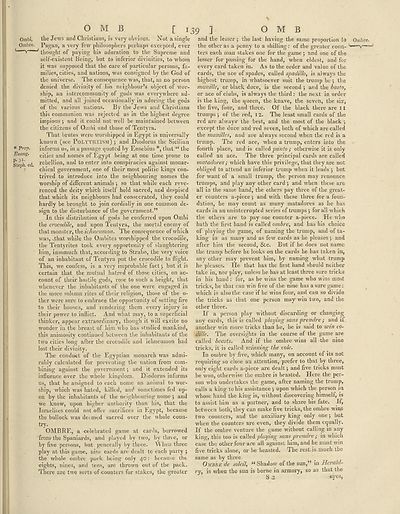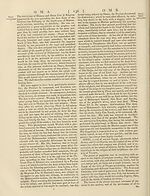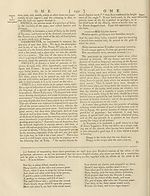Encyclopaedia Britannica > Volume 15, NIC-PAR
(151) Page 139
Download files
Complete book:
Individual page:
Thumbnail gallery: Grid view | List view

O M B [ 139 ] O M B
Ombi,
Ombre.
* Prep.
Evang.
P-32-
Stepli. ed.
the Jews and Christians, is very obvious. Not a single
Pagan, a very tew philosophers perhaps excepted, ever
J thought of paying his adoration to the Supreme and
self-existent Being, but to inferior divinities, to whom
it was supposed that the care of particular persons, fa¬
milies, cities, and nations, was consigned by the God of
the universe. The consequence w as, that, as no person
denied the divinity of his neighbour’s object of wor¬
ship, an intercommunity of gods was everywhere ad¬
mitted, and all joined occasionally in adoring the gods
of the various nations. By the Jews and Christians
this communion was rejected as in the highest degree
impious j and it could not well be maintained between
the citizens of Ombi and those of Tentyra.
That brutes were worshipped in Egypt is universally
known (see Polytheism) j and Diodorus the Sicilian
informs us, in a passage quoted by Eusebius *, that “ the
cities and nomes of Egypt being at one time prone to
rebellion, and to enter into conspiracies against monar¬
chical government, one of their most politic kings con¬
trived to introduce into the neighbouring nomes the
worship of different animals •, so that while each reve¬
renced the deity which itself held sacred, and despised
that which its neighbours had consecrated, they could
hardly be brought to join cordially in one common de¬
sign to the disturbance of the government.”
In this distribution of gods he conferred upon Ombi
the crocodile, and upon Tentyra, the mortal enemy of
that monster, the ichneumon. The consequence of which
was, that while the Ombites worshipped the crocodile,
the Tentyrites took every opportunity of slaughtering
him, insomuch that, according to Strabo, the very voice
of an inhabitant of Tentyra put the crocodile to flight.
This, we confess, is a very improbable fact; but it is
certain that the mutual hatred of those cities, on ac¬
count of their hostilq gods, rose to such a height, that
whenever the inhabitants of the one were engaged in
the more solemn rites of their religion, those of the o-
ther were sure to embrace the opportunity of setting fire
to their houses, and rendering them every injury in
their power to inflict. And what may, to a superficial
thinker, appear extraordinary, though it will excite no
wonder in the breast of him who has studied mankind,
this animosity continued between the inhabitants of the
two cities long after the crocodile and ichneumon had
lost their divinity.
The conduct of the Egyptian monarch was admi¬
rably calculated for preventing the nation from com¬
bining against the government j and it extended its
influence over the whole kingdom. Dtodorus informs
us, that he assigned to each nome an animal to wor¬
ship, which wras hated, killed, and sometimes fed up¬
on by the inhabitants of the neighbouring nome ; and
we know, upon higher authority than his, that the
Israelites could not offer sacrifices in Egypt, because
the bullock was deemed sacred over the whole coun¬
try.
OMBRE, a celebrated game at cards, borrowed
from-the Spaniards, and played by two, by three, or
by five persons, but generally by three. W hen three
play at this game, nine cards are dealt to each party $
the whole ombre pack being only 40: because the
eights, nines, and tens, are thrown out of the pack.
There are two sorts of counters for stakes, the greater
and the lesser ; the last having the same proportion to
the other as a penny to a shilling: of the greater coun¬
ters each man stakes one for the game; and one of the
lesser for passing for the hand, when eldest, and for
every card taken in. As to the order and value of the
cards, the ace of spades, called spadillo, is always the
highest trump, in whatsoever suit the trump be ; the
manille, or black duce, is the second ; and the hasto,
or ace of clubs, is always the third: the next in order
is the king, the queen, the knave, the seven, the six”,
the five, four, and three. Of the black there are 11
trumps j of the red, 12. The least small cards of the
red are always* the best, and the most of the black;
except the duce and red seven, both of which are called
the manille a, and are always second when the red is a
trump. The red ace, when a trump, enters into the
fourth place, and is called ; otherwise it is only
called an ace. The three principal cards are called
matadores; which have this privilege, that they are not
obliged to attend an inferior trump when it leads ; but
for want of a small trump, the person may renounce
trumps, and play any other card ; and when these are
all in the same hand, the others pay three of the great¬
er counters a-piece; and with these three for a foun¬
dation, he may count as many matadores as he has
cards in an uninterrupted series of trumps ; for all which
the others are to pay one counter a-piece. He who
hath the first hand is called ombre, and has his choice
of playing the game, of naming the trump, and of ta¬
king in as many and as few cards as he pleases ; and
after him the second, &c. But if he does not name
the trump before he looks on the cards he has taken in,
any other may prevent him, by naming what trump
he pleases. He that has the first hand should neither
take in, nor play, unless he has at least three sure tricks
in his hand : for, as he wins the game who wins most
tricks, he that can win five of the nine has a sure game:
which is also the case if he wins four, and can so divide
the tricks as that one person may win two, and the
other three.
If a person play without discarding or changing
any cards, this is called playing sans prendre ; and it
another win more tricks than he, he is said to win co-
dille. The oversights in the course of the game are
called beasts. And if the ombre wins all the nine
tricks, it is called winning the vole.
In ombre by five, which many, on account of its not
requiring so close an attention, prefer to that by three,
only eight cards a-piece are dealt; and five tricks must
be won, otherwise the ombre is beasted. Here the per¬
son who undertakes the game, after naming the trump,
calls a king to his assistance ; upon which the person in
whose hand the king is, without discovering himself, is
to assist him as a partner, and to share his fate. If,
between both, they can make five tricks, the ombre wiqs
two counters, and the auxiliary king only one; but
when the counters are even, they divide them equally.
If the ombre venture the game without calling in any
king, this too is called playing sans prendre ; in which
case the other four are all against him, and he must win
five tricks alone, or be beasted. The rest-is.much.the
same as by three
Ombre de soldi, “ Shadow ot the sun,” in Herald¬
ry, is when the sun is borne in armory, so as that the
S 2 eyes,
Ombre.
Ombi,
Ombre.
* Prep.
Evang.
P-32-
Stepli. ed.
the Jews and Christians, is very obvious. Not a single
Pagan, a very tew philosophers perhaps excepted, ever
J thought of paying his adoration to the Supreme and
self-existent Being, but to inferior divinities, to whom
it was supposed that the care of particular persons, fa¬
milies, cities, and nations, was consigned by the God of
the universe. The consequence w as, that, as no person
denied the divinity of his neighbour’s object of wor¬
ship, an intercommunity of gods was everywhere ad¬
mitted, and all joined occasionally in adoring the gods
of the various nations. By the Jews and Christians
this communion was rejected as in the highest degree
impious j and it could not well be maintained between
the citizens of Ombi and those of Tentyra.
That brutes were worshipped in Egypt is universally
known (see Polytheism) j and Diodorus the Sicilian
informs us, in a passage quoted by Eusebius *, that “ the
cities and nomes of Egypt being at one time prone to
rebellion, and to enter into conspiracies against monar¬
chical government, one of their most politic kings con¬
trived to introduce into the neighbouring nomes the
worship of different animals •, so that while each reve¬
renced the deity which itself held sacred, and despised
that which its neighbours had consecrated, they could
hardly be brought to join cordially in one common de¬
sign to the disturbance of the government.”
In this distribution of gods he conferred upon Ombi
the crocodile, and upon Tentyra, the mortal enemy of
that monster, the ichneumon. The consequence of which
was, that while the Ombites worshipped the crocodile,
the Tentyrites took every opportunity of slaughtering
him, insomuch that, according to Strabo, the very voice
of an inhabitant of Tentyra put the crocodile to flight.
This, we confess, is a very improbable fact; but it is
certain that the mutual hatred of those cities, on ac¬
count of their hostilq gods, rose to such a height, that
whenever the inhabitants of the one were engaged in
the more solemn rites of their religion, those of the o-
ther were sure to embrace the opportunity of setting fire
to their houses, and rendering them every injury in
their power to inflict. And what may, to a superficial
thinker, appear extraordinary, though it will excite no
wonder in the breast of him who has studied mankind,
this animosity continued between the inhabitants of the
two cities long after the crocodile and ichneumon had
lost their divinity.
The conduct of the Egyptian monarch was admi¬
rably calculated for preventing the nation from com¬
bining against the government j and it extended its
influence over the whole kingdom. Dtodorus informs
us, that he assigned to each nome an animal to wor¬
ship, which wras hated, killed, and sometimes fed up¬
on by the inhabitants of the neighbouring nome ; and
we know, upon higher authority than his, that the
Israelites could not offer sacrifices in Egypt, because
the bullock was deemed sacred over the whole coun¬
try.
OMBRE, a celebrated game at cards, borrowed
from-the Spaniards, and played by two, by three, or
by five persons, but generally by three. W hen three
play at this game, nine cards are dealt to each party $
the whole ombre pack being only 40: because the
eights, nines, and tens, are thrown out of the pack.
There are two sorts of counters for stakes, the greater
and the lesser ; the last having the same proportion to
the other as a penny to a shilling: of the greater coun¬
ters each man stakes one for the game; and one of the
lesser for passing for the hand, when eldest, and for
every card taken in. As to the order and value of the
cards, the ace of spades, called spadillo, is always the
highest trump, in whatsoever suit the trump be ; the
manille, or black duce, is the second ; and the hasto,
or ace of clubs, is always the third: the next in order
is the king, the queen, the knave, the seven, the six”,
the five, four, and three. Of the black there are 11
trumps j of the red, 12. The least small cards of the
red are always* the best, and the most of the black;
except the duce and red seven, both of which are called
the manille a, and are always second when the red is a
trump. The red ace, when a trump, enters into the
fourth place, and is called ; otherwise it is only
called an ace. The three principal cards are called
matadores; which have this privilege, that they are not
obliged to attend an inferior trump when it leads ; but
for want of a small trump, the person may renounce
trumps, and play any other card ; and when these are
all in the same hand, the others pay three of the great¬
er counters a-piece; and with these three for a foun¬
dation, he may count as many matadores as he has
cards in an uninterrupted series of trumps ; for all which
the others are to pay one counter a-piece. He who
hath the first hand is called ombre, and has his choice
of playing the game, of naming the trump, and of ta¬
king in as many and as few cards as he pleases ; and
after him the second, &c. But if he does not name
the trump before he looks on the cards he has taken in,
any other may prevent him, by naming what trump
he pleases. He that has the first hand should neither
take in, nor play, unless he has at least three sure tricks
in his hand : for, as he wins the game who wins most
tricks, he that can win five of the nine has a sure game:
which is also the case if he wins four, and can so divide
the tricks as that one person may win two, and the
other three.
If a person play without discarding or changing
any cards, this is called playing sans prendre ; and it
another win more tricks than he, he is said to win co-
dille. The oversights in the course of the game are
called beasts. And if the ombre wins all the nine
tricks, it is called winning the vole.
In ombre by five, which many, on account of its not
requiring so close an attention, prefer to that by three,
only eight cards a-piece are dealt; and five tricks must
be won, otherwise the ombre is beasted. Here the per¬
son who undertakes the game, after naming the trump,
calls a king to his assistance ; upon which the person in
whose hand the king is, without discovering himself, is
to assist him as a partner, and to share his fate. If,
between both, they can make five tricks, the ombre wiqs
two counters, and the auxiliary king only one; but
when the counters are even, they divide them equally.
If the ombre venture the game without calling in any
king, this too is called playing sans prendre ; in which
case the other four are all against him, and he must win
five tricks alone, or be beasted. The rest-is.much.the
same as by three
Ombre de soldi, “ Shadow ot the sun,” in Herald¬
ry, is when the sun is borne in armory, so as that the
S 2 eyes,
Ombre.
Set display mode to:
![]() Universal Viewer |
Universal Viewer | ![]() Mirador |
Large image | Transcription
Mirador |
Large image | Transcription
Images and transcriptions on this page, including medium image downloads, may be used under the Creative Commons Attribution 4.0 International Licence unless otherwise stated. ![]()
| Encyclopaedia Britannica > Encyclopaedia Britannica > Volume 15, NIC-PAR > (151) Page 139 |
|---|
| Permanent URL | https://digital.nls.uk/192583661 |
|---|
| Attribution and copyright: |
|
|---|
| Shelfmark | EB.11 |
|---|---|
| Description | Ten editions of 'Encyclopaedia Britannica', issued from 1768-1903, in 231 volumes. Originally issued in 100 weekly parts (3 volumes) between 1768 and 1771 by publishers: Colin Macfarquhar and Andrew Bell (Edinburgh); editor: William Smellie: engraver: Andrew Bell. Expanded editions in the 19th century featured more volumes and contributions from leading experts in their fields. Managed and published in Edinburgh up to the 9th edition (25 volumes, from 1875-1889); the 10th edition (1902-1903) re-issued the 9th edition, with 11 supplementary volumes. |
|---|---|
| Additional NLS resources: |
|

